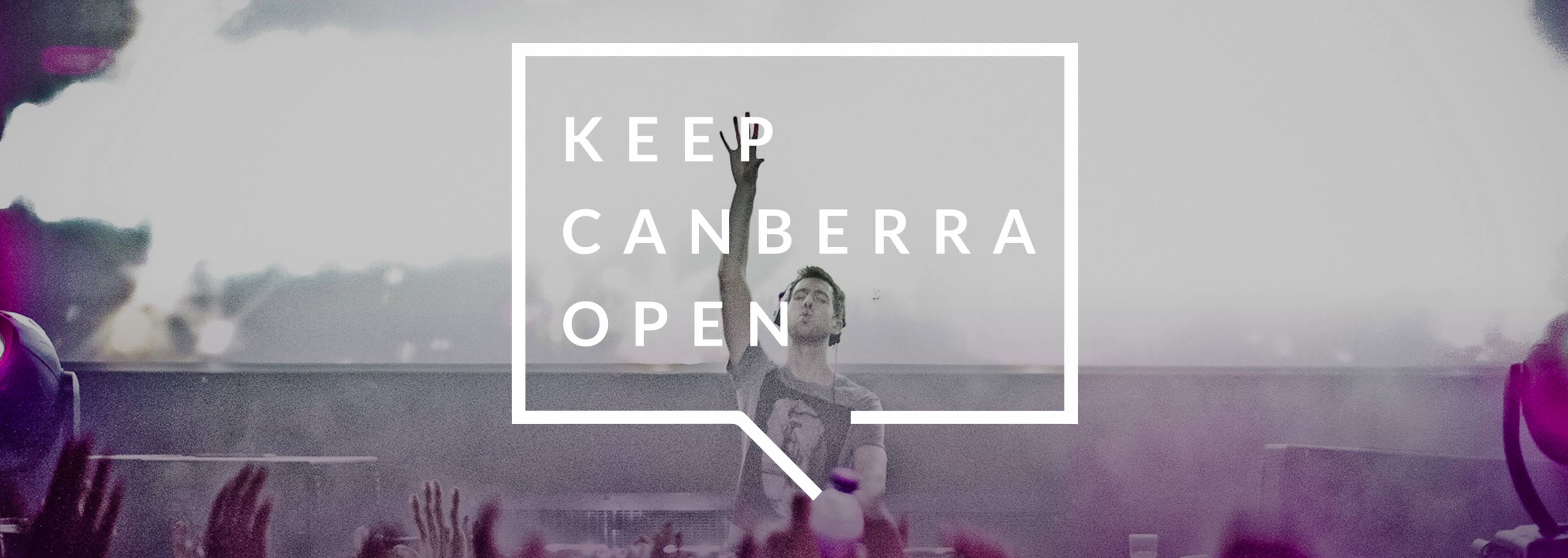Keep Canberra Open announces rally over proposed changes

Keep Canberra Open, the campaign spearheaded since May by the capital city’s venue operators to protest proposed stricter drinking laws, is holding its first rally.
Set for midday on Saturday July 30 at Garema Place, it includes local nightlife advocates, with speeches from key industry figures and performances by musicians and DJs.
The gathering will march along Alinga Street to Northbourne Avenue and London Circuit. It finishes at the ACT Legislative Assembly where the Government will be presented with a Keep Canberra Open petition.
The petition asks that any changes to the ACT’s liquor laws not include two of the ACT Attorney-General Simon Corbell’s proposals outlined in the Building on Liquor Reform: White Paper. These are a ban on alcohol after 3 am rather than the current 5 am, and that late night venues be hit with higher licence fees to pay for greater security measures as police patrols, lighting and security cameras.
As of last night, the petitionhad 7,348 signatures.
The timing of the rally is significant. On Tuesday August 2, the proposed policies will be released to the Legislative Assembly.
Senator Corbell’s paper suggests that venues which stop trading at 3am will continue paying current fees. There will be a 300% increase in fees for those opening to 4 am, costing just over $100,000 a year. A 5 am licence will jump 500% to $163,000.
Senator Corbell has commented, “These businesses turn over millions of dollars in revenue every year and … there is clearly is a commercial advantage for them to trade late. What we are trying to indicate is there is also a cost to trading late.”
According to the white paper, a third of all assaults involving alcohol in public places in Canberra happen between 3am and 6am. Half of ambulance attendances in the city between 3am and 4am involve alcohol. Canberra has 38 clubs, bars and nightclubs licensed to sell till 4am (22 of them are clubs), and another 11 (mostly nightclubs) licensed till 5am.
Because of the problem of clubbers “pre-loading”, the ACT Government’s scheme is that bottle shops should also bear some costs of new safety measures. Larger bottle shops, which turnover $1 million a year, should pay 25% more in licence fees, the proposal suggests.
But restaurants, small bars and small music venues (80 patrons or less) which close at midnight would have a 75% reduction in their fees.
The ACT Government has repeatedly stressed that it is not considering early lock-outs, as has happened in NSW and Queensland. Senator Corbell says said evidence suggests it was not lockout laws in themselves, but closing times, that made a difference to late-night violence.
Keep Canberra Open calls it “a dangerous experiment” and warns that the policies “suggest sending local patrons out onto the streets at 3am, with no plan as to how to police or manage the fallout.”
Campaign spokesperson Ryan Sabet says, “The proposed legislation changes are a lockout in disguise and they’ll end the late-night industry… and they’ll also destroy thousands of jobs.”
The group, which points out that alcohol-related assaults have declined by 11% across the ACT in recent times. It suggests that rather than new rules that would destroy “our vibrant music and late-night entertainment district”, other options should be considered.
These include more police on the beat, more public transport in the entertainment precincts, greater collaboration with venues and police, and stronger penalties for people who cause violence and for venues that do not serve alcohol responsibly.
Keep Canberra Open argues, “The music community and law-abiding citizens are not the right people to punish for assaults on the street. Well-run venues are safe and they make a large contribution to our reputation as one of the world’s great entertainment cities.”
The Government is under pressure to introduce lock-outs. Michael Moore, co-Chair of National Alliance for Action on Alcohol earlier accused it of “going soft” during an election year and reiterated that assaults increased in the early hours.
Steve Robson, the new President of the Australian Medical Association is determined to revive the lockout debate in Canberra. Professor Robson, an obstetrics specialist and academic at the Australian National University, says, “The role of lockout laws in Newcastle and Sydney … shows a clear reduction in presentations to emergency departments.”

































